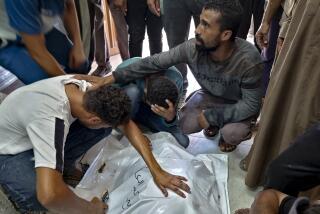Egypt protests turn deadly Friday; at least 30 killed, doctors say
- Share via
CAIRO - At least 30 people were killed Friday, field hospital doctors said, in a new round of Egyptian protests calling for the ouster of military rule and in response to Wednesday’s crackdown in which more than 500 people were slain when security forces dispersed two encampments supporting ousted President Mohamed Morsi.
Wednesday was the bloodiest day in Egypt’s ongoing unrest and many of those who came out in protest after Friday prayers said they were doing so because of the bloodshed earlier in the week.
Security forces began firing tear gas followed by live ammunition hours after the protesters began converging on Ramses Square and calling for the execution of Gen. Abdel Fattah Sisi, who leads the military, and Mohamad Ibrahim, head of the interior ministry, who a day earlier had authorized police to use deadly force.
An initial Health Ministry report said nine people had died in clashes Friday, but doctors in Ramses Square alone said at least 30 people were killed.
The injured and dead were brought to Fatih mosque overlooking the square, where just hours earlier people had converged for Friday prayer and a sermon that called for continuing the protests.
Inside the mosque was a scene of pandemonium.
In the back corner of the prayer area, people had cordoned off room for dead bodies to be laid side by side. But it quickly filled up.
“Martyr, martyr,” men yelled as they carried in one more body.
The hands of the dead were tied together.
As someone made the call for afternoon prayers, another body was brought in.
Family members pleaded to be let in to the area to say rushed final goodbyes. Before they were covered in a white sheet, the bottom half of some men’s bodies were covered for modesty by scarves that people had brought to stave off tear gas.
Many who descended on the square Friday came expecting a deadly response. Women and men wrote their names and phone numbers of family on their arms or on stickers stuck on clothes.
Sayid Qutib, holding up a handwritten cardboard sign that read simply, “Martyrs,” stood on a bench next to the area.
The mosque was hot and stuffy and men took off their shirts to provide a bit of a breeze for those injured.
Jumaa al-Ajawan lay next to the wall at the front of the mosque, his pants pulled down around his thighs so that doctors could treat a birdshot wound near his hip. He was shot as he was helping carry another injured man who had been struck by live ammunition.
“It was the police and the thugs,” said Al-Aiawan, a butcher from Sharia, a Cairo suburb. “We were standing peacefully, no one has any weapons. But as our numbers grew we were forced to spread out and we got closer to the police and they began firing on us.”
“We were shocked with the heavy gunfire, without any justification or reason,” he said.
ALSO:
New Iran president wins approval for most Cabinet choices
At 123, Bolivian man may be the oldest human who ever lived
Death toll from car bombing in Hezbollah’s Beirut stronghold at least 14
More to Read
Sign up for Essential California
The most important California stories and recommendations in your inbox every morning.
You may occasionally receive promotional content from the Los Angeles Times.











